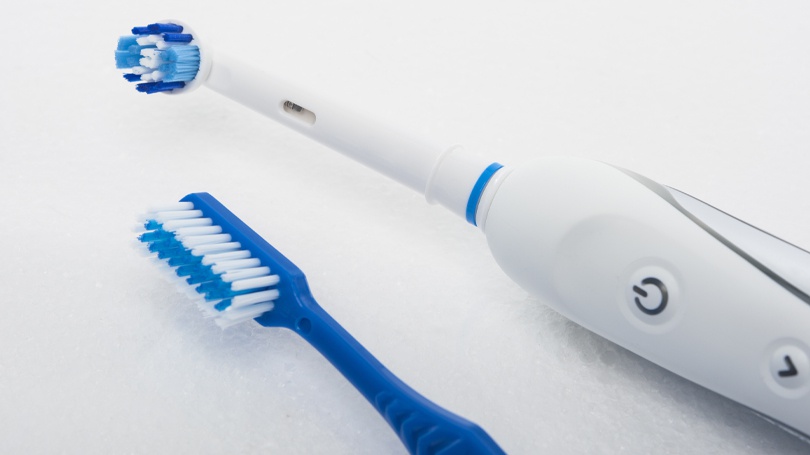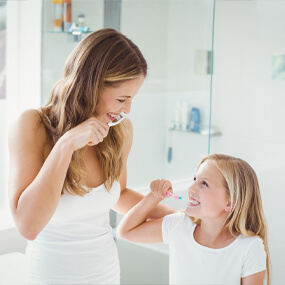Toothbrush Face-Off: Electric vs. Manual

Dental plaque is the leading cause of tooth decay and gum disease, and consistent oral hygiene is necessary to remove that plaque and disrupt it so that it does not calcify into dental calculus. Proper hygiene, according to the American Dental Association (ADA), includes brushing twice a day for two to three minutes using a soft-bristled toothbrush or brush head and fluoride toothpaste. The ADA also recommends flossing your teeth and scraping your tongue whenever you brush.
The Debate: Manual vs. Electric
The ADA has not taken a hard stance on electric versus manual toothbrushes. In fact, the topic is polarizing within the industry, and there are strong arguments on both sides. There are pros and cons to both, and there are certainly some characteristics that can make one option better for certain people. Let us look at the advantages and disadvantages that each option may present you:
Manual Toothbrushes
Advantages
- Inexpensive
- Portable
- No batteries or charging time
- Easy to discard and replace
- Available in many different styles
Disadvantages
- Lack a timer
- Require good brushing technique
- Can be difficult to use for some
Electric Toothbrushes
Advantages
- Can time your brushing
- Can make brushing more exciting
- Easier for children to use
- Easier for anyone with dexterity challenges
- Convenient for people wearing braces
- Available in a variety of motions
Disadvantages
- Relatively expensive
- Higher total cost of ownership
- Require batteries or charging
- Susceptible to breaking
Are Electric Toothbrushes Better Than Manual?
The ADA emphasizes that what matters is the brusher more than the brush. To put it another way, if you use a manual toothbrush properly and on a regular basis, you could not improve that level of care by using an electric one. However, there are mitigating circumstances for many people. If you have arthritis, for instance, that makes brushing difficult, and using an electric would certainly be more effective.
Not everyone agrees with the ADA that electric toothbrushes provide no advantage over manual. Consider that Consumer Reports—which is not a dental association but a nonprofit consumer advocacy organization—analyzed more than 50 clinical studies and came to the conclusion that electric toothbrushes did provide a minor advantage. Of course, this analysis did not account for the unique circumstances of each brusher, and in the end, Consumer Reports did agree with the ADA that effectiveness has a lot more to do with the person than the particular style of toothbrush.
That could mean that when in doubt, the electric toothbrush is the better option. Ideally, however, a person should try both kinds as well as different styles and various brushes. The important thing is that you brush your teeth twice a day for the recommended time, and you should choose whichever product lets you do that with the most ease and comfort. In other words, it comes down to preference.
Which Brush Should You Use?
Whether you choose electric or manual, there are various other choices you will have to make as well. There are various bristle types, angles, lengths, weights, shapes, and so forth.
- Bristles: The ADA recommends a soft-bristled brush. Scrubbing is not required to clean your teeth, and soft bristles help to ensure that you do not damage your gums or erode your tooth enamel, which can lead to sensitivity. How soft should the bristles be? This is a matter of preference, as well. Choose the softest bristles that let you do a good job well and make your teeth feel clean.
- Brush head: Brush heads should be small enough to make those hard-to-reach areas easier to reach. How small depends on the size and shape of your mouth and the other specifics of your brush.
There are many other characteristics to consider, as well. You can choose from handles with flexible necks as well as non-slip grips. Many toothbrush brands offer various head shapes, including tapered and rectangular, and you can get soft bristles that are curved, rippled, trimmed, and so forth. The right choice for all of these options comes down to which you prefer because it makes it easier for you to brush. Also, do not discount the value of being drawn to a particular feature for whatever reason.
Choose the Best Toothbrush for You
What is important is that you select a toothbrush with which you are comfortable and allows you to brush your teeth effectively. If you remain unsure which to use, consult with your dentist for advice. Jeffrey D. Clark, DDS, is a premier dentist serving the Greater Scottsdale area who can help you weigh the pros and cons and make a choice. Contact Scottsdale Cosmetic Dentistry Excellence with any questions you may have and to schedule your next checkup.




